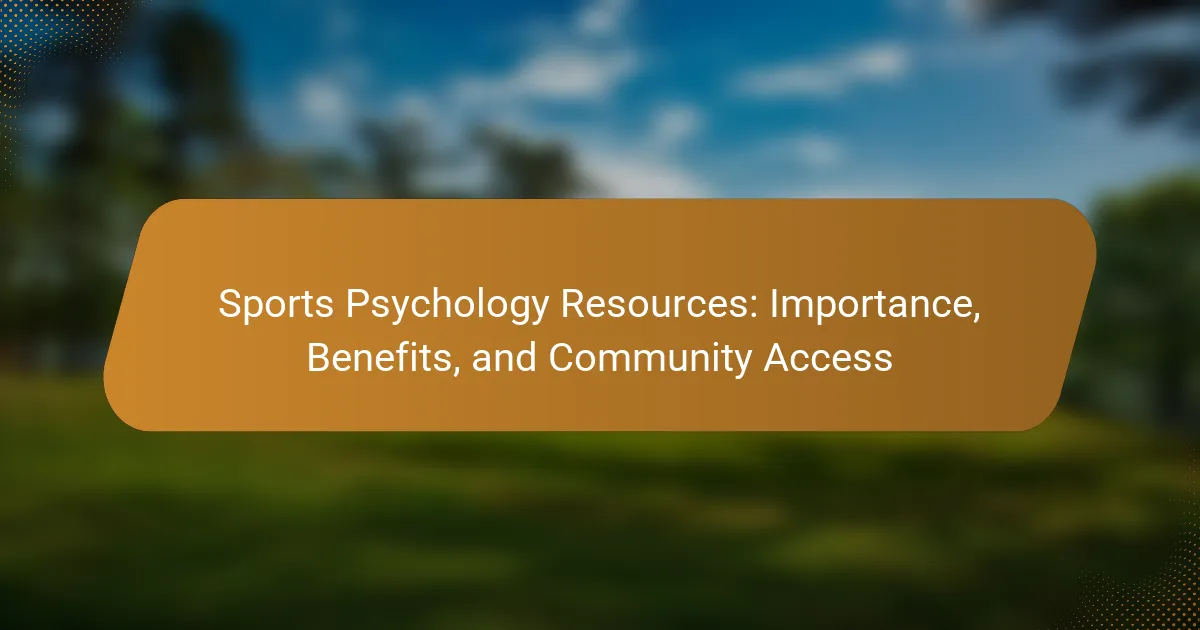Sports psychology resources are crucial for athletes seeking to enhance mental resilience and performance. These resources provide strategies for stress management, focus improvement, and emotional regulation. Accessing community support and expert guidance empowers athletes to overcome challenges and achieve their goals. Various resources, including workshops, online courses, and personalized coaching, cater to diverse athlete needs, fostering a supportive environment for mental development.
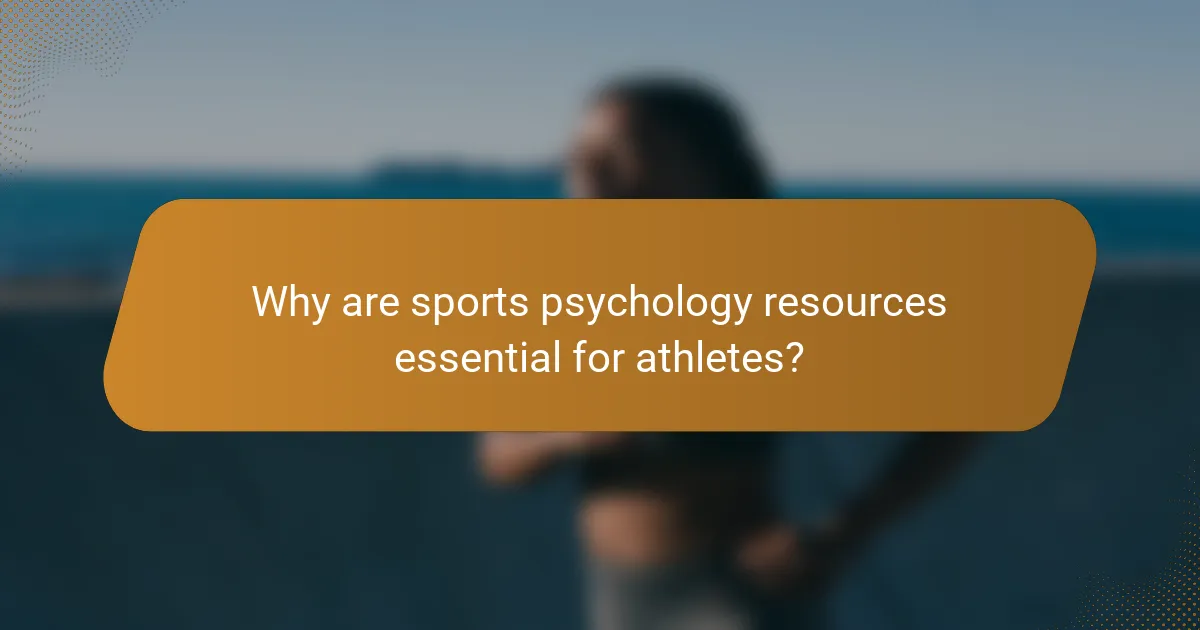
Why are sports psychology resources essential for athletes?
Sports psychology resources are essential for athletes as they enhance mental resilience and performance. These resources provide strategies to manage stress, improve focus, and foster a positive mindset. Access to community support and expert guidance further empowers athletes to overcome challenges and achieve their goals. Research shows that athletes utilizing these resources experience improved outcomes in competitions and overall well-being.
How do sports psychology resources enhance mental resilience?
Sports psychology resources enhance mental resilience by providing athletes with strategies to manage stress, focus on performance, and develop coping mechanisms. These resources include techniques like visualization, mindfulness, and goal-setting, which help athletes maintain a positive mindset. Access to community support through workshops, seminars, and online forums fosters a sense of belonging, enabling athletes to share experiences and learn from one another. As a result, athletes can build confidence and improve their overall mental health, leading to better performance outcomes.
What role do sports psychology resources play in injury recovery?
Sports psychology resources play a crucial role in injury recovery by enhancing mental resilience and fostering a positive mindset. These resources provide emotional support, coping strategies, and techniques to manage anxiety and frustration during rehabilitation. Engaging with sports psychologists can help athletes set realistic goals, maintain motivation, and improve focus on recovery. Accessing community resources further enhances support networks, creating a collaborative environment for healing.
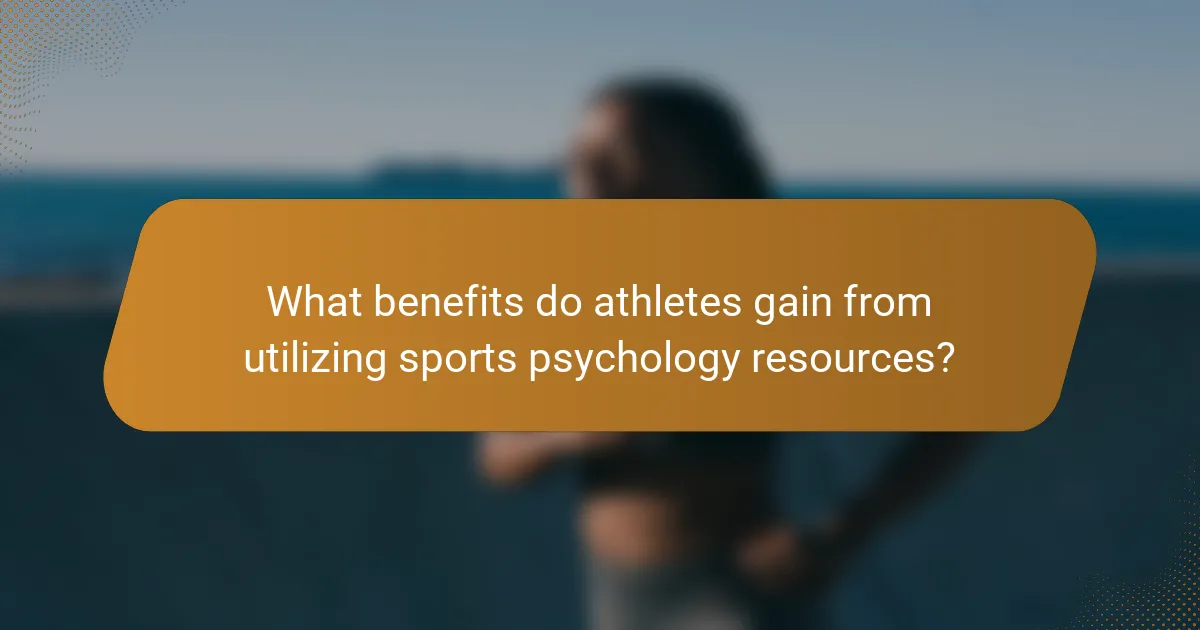
What benefits do athletes gain from utilizing sports psychology resources?
Athletes gain mental resilience, improved focus, and enhanced performance by utilizing sports psychology resources. These resources help athletes manage stress, develop coping strategies, and maintain motivation. Access to sports psychology can lead to better emotional regulation, which is crucial during competitions. Additionally, athletes can benefit from visualization techniques, boosting their confidence and overall performance.
How can sports psychology resources improve performance under pressure?
Sports psychology resources enhance performance under pressure by providing mental strategies and tools. They help athletes manage anxiety, improve focus, and develop resilience. Techniques such as visualization and self-talk can significantly boost confidence and performance during critical moments. Access to these resources fosters a supportive community, encouraging sharing of experiences and strategies among athletes.
What impact do sports psychology resources have on team dynamics?
Sports psychology resources significantly enhance team dynamics by improving communication, trust, and performance. These resources provide strategies for conflict resolution and foster a supportive environment. Teams utilizing sports psychology often experience increased cohesion and motivation, leading to better overall results. Access to these resources can create a culture of mental wellness, ultimately benefiting both individual players and the team as a whole.
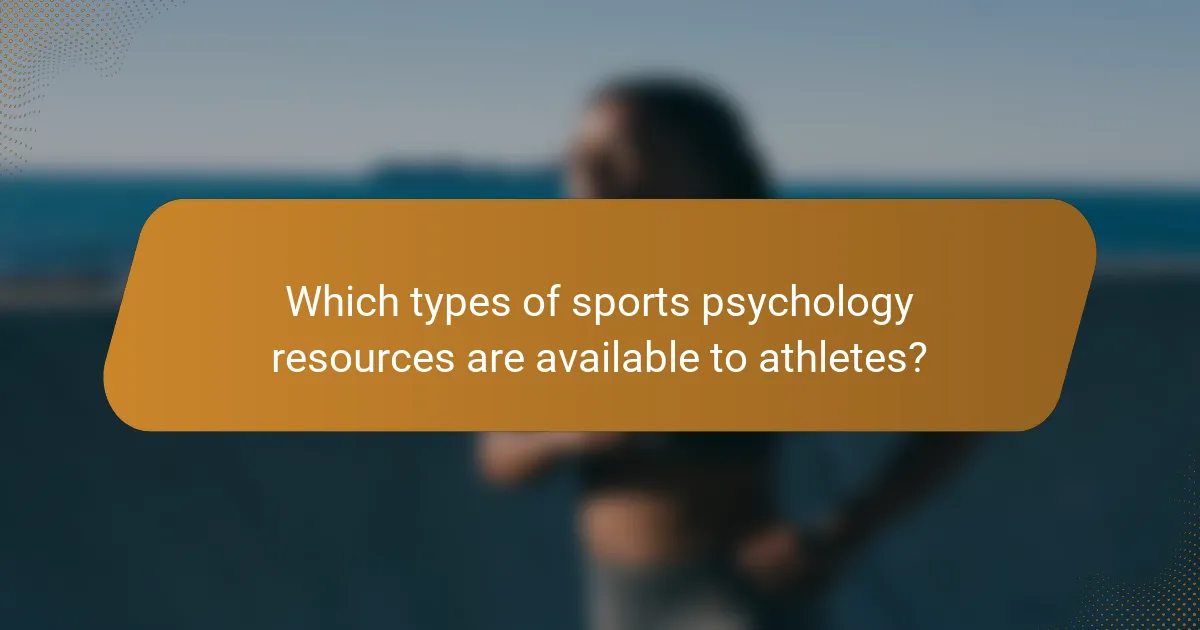
Which types of sports psychology resources are available to athletes?
Athletes have access to various sports psychology resources, including workshops, online courses, and one-on-one coaching. These resources enhance mental resilience and performance.
Common resources include:
– Books and articles on sports psychology techniques
– Podcasts featuring expert interviews and discussions
– Online platforms offering courses and webinars
– Local sports psychology clinics providing personalized support
– Community forums for peer support and shared experiences
Each resource type caters to different athlete needs, fostering a supportive environment for mental development.
What are the differences between online and in-person sports psychology services?
Online sports psychology services offer flexibility and accessibility, while in-person services provide direct interaction and immediate feedback. Online sessions can be scheduled easily, accommodating diverse lifestyles. In-person services often foster a stronger therapeutic alliance through face-to-face engagement. Additionally, online platforms may utilize various digital tools for assessments, while in-person settings rely on traditional methods. Both formats aim to enhance athletes’ mental well-being, but the choice depends on individual preferences and needs.
How do workshops and seminars contribute to athlete development?
Workshops and seminars significantly enhance athlete development by providing targeted knowledge and skills. These events foster mental resilience, improve focus, and develop coping strategies through expert insights in sports psychology.
They create a collaborative environment, allowing athletes to share experiences and learn from peers. Access to community resources during these events strengthens support networks, promoting ongoing personal and professional growth.
Additionally, workshops often feature practical exercises that help athletes apply psychological concepts in real scenarios, enhancing performance. This hands-on approach cultivates a deeper understanding of mental conditioning, which is essential for competitive success.
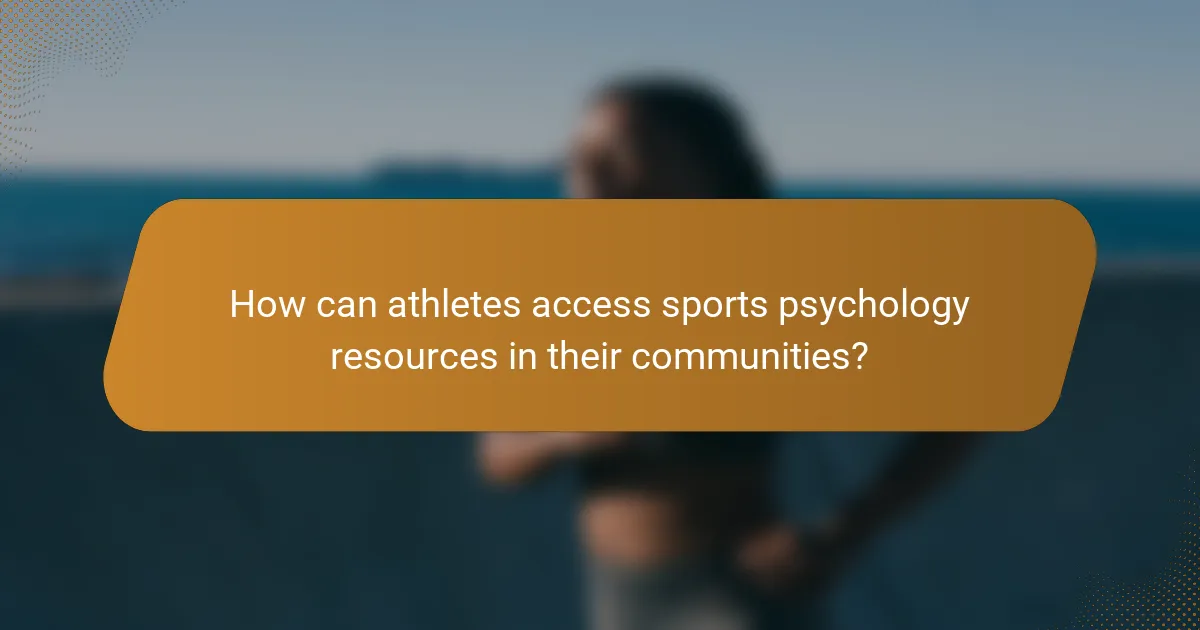
How can athletes access sports psychology resources in their communities?
Athletes can access sports psychology resources in their communities through local sports organizations, universities, and mental health clinics. Many communities offer workshops, seminars, and counseling services tailored to athletes’ needs. These resources enhance mental resilience, improve performance, and provide coping strategies for stress and anxiety. Additionally, online platforms and social media can connect athletes with professionals and peer support groups.
Which organizations provide sports psychology support in various regions?
Various organizations provide sports psychology support across different regions. These include national sports federations, universities with sports psychology programs, private practices, and non-profit organizations dedicated to athlete mental health.
| Organization Type | Examples | Regions Covered |
|—————————|——————————————-|————————-|
| National Sports Federations| U.S. Olympic & Paralympic Committee | United States |
| Universities | University of Florida, University of Denver| North America |
| Private Practices | Mental Performance Group, SportsMind | Global |
| Non-Profit Organizations | The Athlete Mental Health Initiative | Various International |
How can local sports clubs integrate sports psychology resources?
Local sports clubs can effectively integrate sports psychology resources by collaborating with professionals, providing workshops, and facilitating access to mental health tools. This integration enhances athletes’ performance and well-being, fostering a supportive community environment.
1. Partner with certified sports psychologists for regular consultations.
2. Organize workshops focusing on mental resilience and coping strategies.
3. Create online platforms for athletes to access psychological resources.
4. Encourage open discussions about mental health within the club.
5. Implement team-building activities that emphasize psychological well-being.
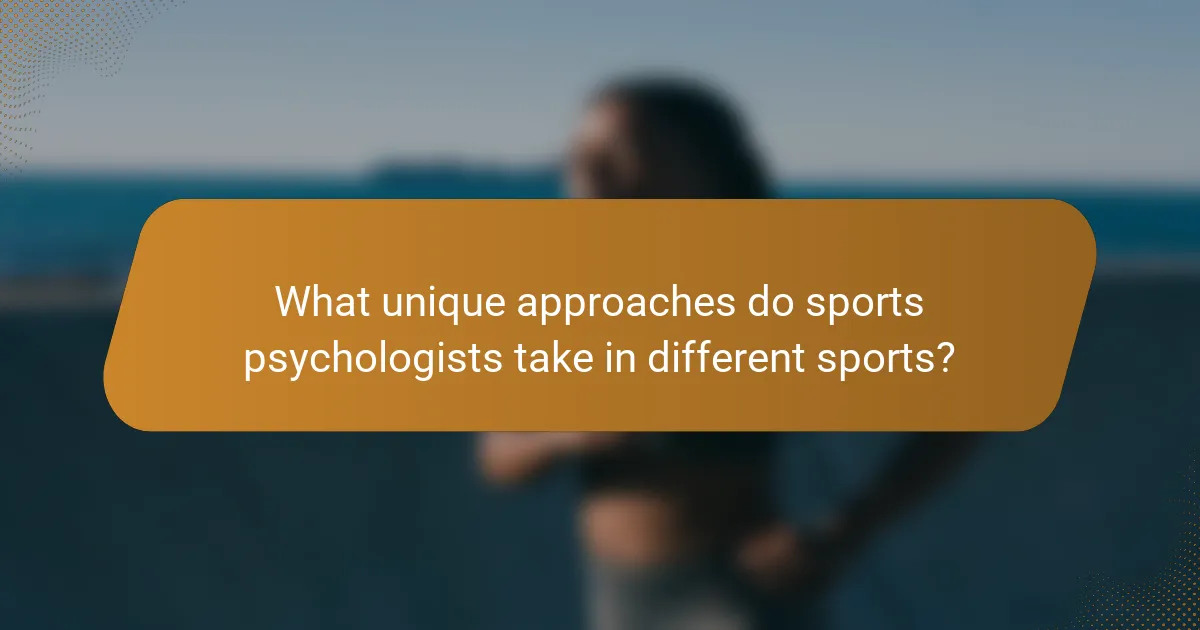
What unique approaches do sports psychologists take in different sports?
Sports psychologists employ unique strategies tailored to specific sports, enhancing athlete performance and mental resilience. In team sports, they often focus on communication and cohesion, while individual sports emphasize self-regulation and motivation techniques.
For example, in basketball, psychologists might use visualization techniques to improve shooting accuracy, whereas in tennis, they may implement mindfulness practices to enhance focus during matches. These tailored approaches address the unique challenges athletes face in their respective sports.
Additionally, sports psychologists analyze the mental demands of each sport, developing sport-specific interventions that cater to an athlete’s psychological needs. This customization enhances overall mental fitness, leading to improved performance outcomes.
How do sports psychology practices vary between individual and team sports?
Sports psychology practices differ significantly between individual and team sports. Individual sports often focus on self-regulation, mental resilience, and personal goal-setting. In contrast, team sports emphasize communication, group dynamics, and collective motivation.
Individual athletes benefit from tailored mental strategies, enhancing focus and personal performance. Team athletes, however, require cohesion-building techniques to foster trust and synergy among members.
Research indicates that individual sports may lead to higher levels of anxiety due to personal performance pressures, while team sports can mitigate stress through shared experiences. Both spheres utilize visualization and relaxation techniques, but their applications vary based on the context of competition.
In summary, while both individual and team sports leverage sports psychology, the emphasis on personal versus collective strategies shapes their unique practices.
What innovative techniques are being used in sports psychology today?
Innovative techniques in sports psychology today include mindfulness training, cognitive-behavioral strategies, and virtual reality simulations. These methods enhance mental resilience, improve focus, and facilitate emotional regulation. Mindfulness helps athletes stay present, while cognitive-behavioral techniques address negative thought patterns. Virtual reality offers immersive experiences for skill development and anxiety management. As a result, athletes gain a competitive edge and improved performance.
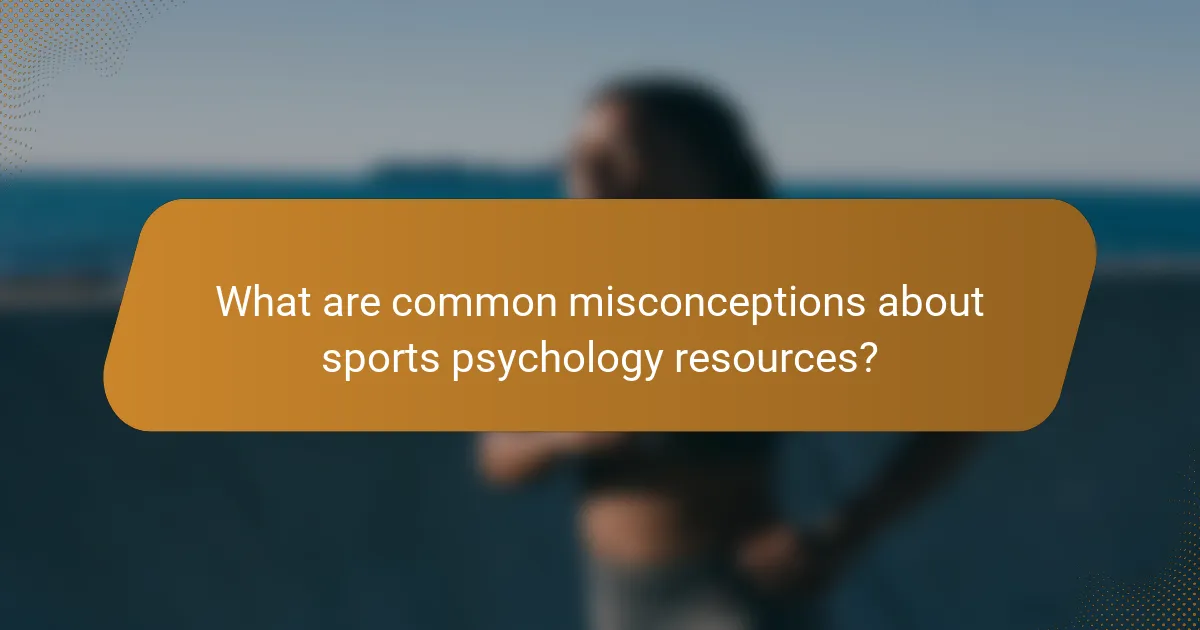
What are common misconceptions about sports psychology resources?
Many people misunderstand sports psychology resources, believing they are only for elite athletes. In reality, these resources benefit all levels of sports participants. Another misconception is that sports psychology solely focuses on mental toughness; it also addresses emotional well-being and performance enhancement. Additionally, some think accessing these resources is expensive or limited, but many community programs offer affordable options. Lastly, there is a belief that sports psychology is only relevant during competitions, while it can be beneficial throughout training and personal development.
Why do some athletes hesitate to seek sports psychology support?
Some athletes hesitate to seek sports psychology support due to stigma and fear of judgment. They often believe that seeking help indicates weakness, which can hinder their performance. Additionally, a lack of awareness about the benefits of sports psychology contributes to this hesitation. Many athletes may not understand how psychological support can enhance their mental resilience and overall performance.
How can addressing stigma improve access to sports psychology resources?
Addressing stigma can significantly enhance access to sports psychology resources by fostering a supportive environment. When stigma is reduced, athletes feel more comfortable seeking help, which leads to increased utilization of available resources. This openness can improve mental health outcomes and performance. Research indicates that stigma reduction initiatives can lead to a 30% increase in service engagement among athletes. By promoting understanding and acceptance, sports organizations can create a culture that values mental well-being, ultimately benefiting the entire community.
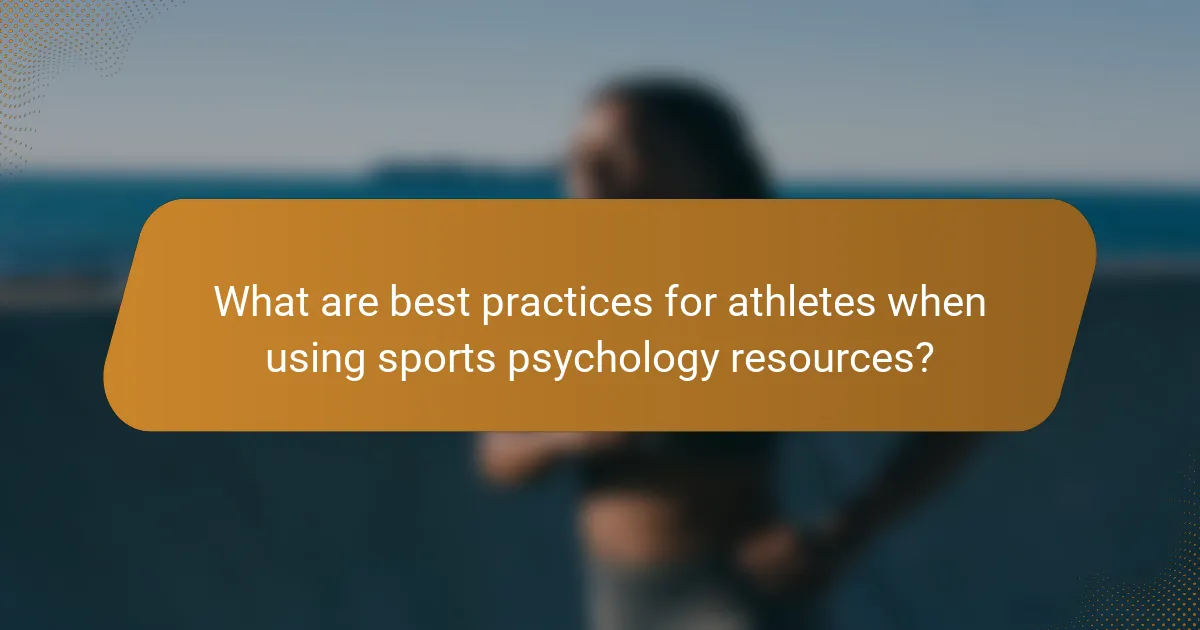
What are best practices for athletes when using sports psychology resources?
Athletes should prioritize consistency, communication, and openness when using sports psychology resources. Engaging regularly with a sports psychologist enhances mental resilience and performance.
1. Set clear goals: Define specific mental skills to develop, such as focus or confidence.
2. Maintain regular sessions: Schedule consistent meetings to build trust and rapport.
3. Practice techniques: Implement strategies learned in sessions during training and competition.
4. Communicate openly: Share thoughts and feelings with the psychologist for tailored support.
5. Reflect on progress: Regularly assess improvements and adjust goals accordingly.
6. Engage with community resources: Participate in workshops or group sessions for broader support.
How can athletes effectively integrate mental training into their routines?
Athletes can effectively integrate mental training into their routines by prioritizing consistent practice and utilizing tailored resources. Engaging with sports psychology techniques enhances focus, resilience, and overall performance.
1. Identify specific mental skills to develop, such as visualization or self-talk.
2. Schedule regular mental training sessions alongside physical workouts.
3. Utilize resources like books, online courses, or workshops to learn techniques.
4. Collaborate with a sports psychologist to create a personalized plan.
5. Monitor progress and adjust strategies based on performance feedback.
Implementing these steps fosters a comprehensive approach to mental training, benefiting athletes in competition and practice.
What common mistakes should athletes avoid when seeking sports psychology support?
Athletes should avoid common mistakes like seeking support too late, ignoring compatibility with the psychologist, or neglecting to set clear goals. These errors can hinder progress and diminish the benefits of sports psychology resources. Athletes must prioritize finding a qualified professional who aligns with their needs and values. Regular communication and commitment to the process are also crucial for effective outcomes.
